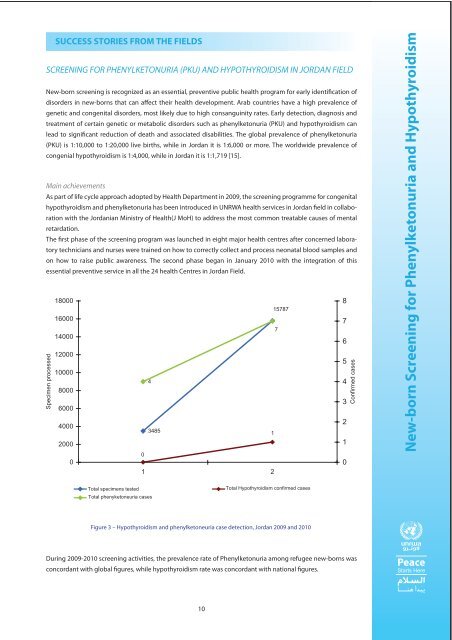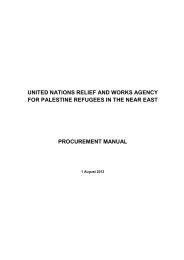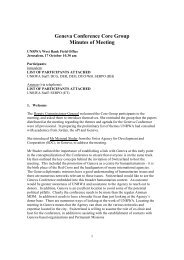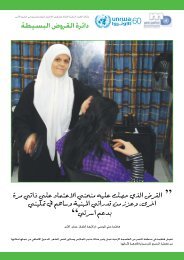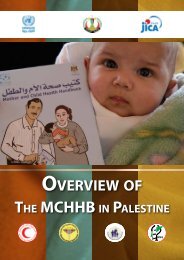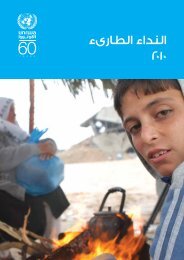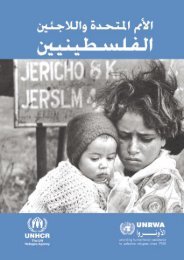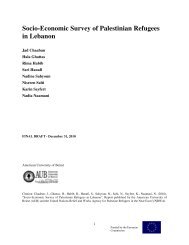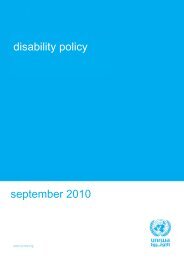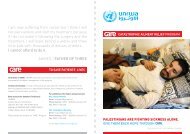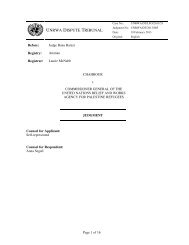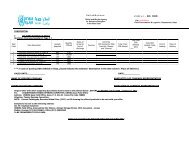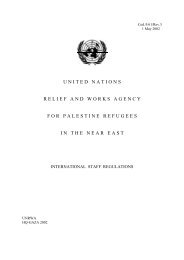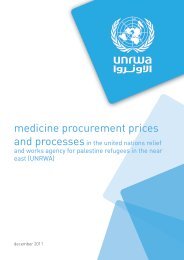Annual Report of the Department of Health 2010 - Unrwa
Annual Report of the Department of Health 2010 - Unrwa
Annual Report of the Department of Health 2010 - Unrwa
You also want an ePaper? Increase the reach of your titles
YUMPU automatically turns print PDFs into web optimized ePapers that Google loves.
SUCCESS STORIES FROM THE FIELDS<br />
SCREENING FOR PHENYLKETONURIA (PKU) AND HYPOTHYROIDISM IN JORDAN FIELD<br />
New-born screening is recognized as an essential, preventive public health program for early identification <strong>of</strong><br />
disorders in new-borns that can affect <strong>the</strong>ir health development. Arab countries have a high prevalence <strong>of</strong><br />
genetic and congenital disorders, most likely due to high consanguinity rates. Early detection, diagnosis and<br />
treatment <strong>of</strong> certain genetic or metabolic disorders such as phenylketonuria (PKU) and hypothyroidism can<br />
lead to significant reduction <strong>of</strong> death and associated disabilities. The global prevalence <strong>of</strong> phenylketonuria<br />
(PKU) is 1:10,000 to 1:20,000 live births, while in Jordan it is 1:6,000 or more. The worldwide prevalence <strong>of</strong><br />
congenial hypothyroidism is 1:4,000, while in Jordan it is 1:1,719 [15].<br />
Main achievements<br />
As part <strong>of</strong> life cycle approach adopted by <strong>Health</strong> <strong>Department</strong> in 2009, <strong>the</strong> screening programme for congenital<br />
hypothyroidism and phenylketonuria has been introduced in UNRWA health services in Jordan field in collaboration<br />
with <strong>the</strong> Jordanian Ministry <strong>of</strong> <strong>Health</strong>(J MoH) to address <strong>the</strong> most common treatable causes <strong>of</strong> mental<br />
retardation.<br />
The first phase <strong>of</strong> <strong>the</strong> screening program was launched in eight major health centres after concerned laboratory<br />
technicians and nurses were trained on how to correctly collect and process neonatal blood samples and<br />
on how to raise public awareness. The second phase began in January <strong>2010</strong> with <strong>the</strong> integration <strong>of</strong> this<br />
essential preventive service in all <strong>the</strong> 24 health Centres in Jordan Field.<br />
Specimen processed<br />
18000<br />
8<br />
15787<br />
16000<br />
7<br />
7<br />
14000<br />
6<br />
12000<br />
5<br />
10000<br />
4<br />
4<br />
8000<br />
3<br />
6000<br />
2<br />
4000<br />
3485<br />
1<br />
2000<br />
1<br />
0<br />
0<br />
0<br />
1 2<br />
Confirmed cases<br />
New-born Screening for Phenylketonuria and Hypothyroidism<br />
Total specimens tested<br />
Total phenyketoneuria cases<br />
Total Hypothyroidism confirmed cases<br />
Figure 3 – Hypothyroidism and phenylketoneuria case detection, Jordan 2009 and <strong>2010</strong><br />
During 2009-<strong>2010</strong> screening activities, <strong>the</strong> prevalence rate <strong>of</strong> Phenylketonuria among refugee new-borns was<br />
concordant with global figures, while hypothyroidism rate was concordant with national figures.<br />
10


